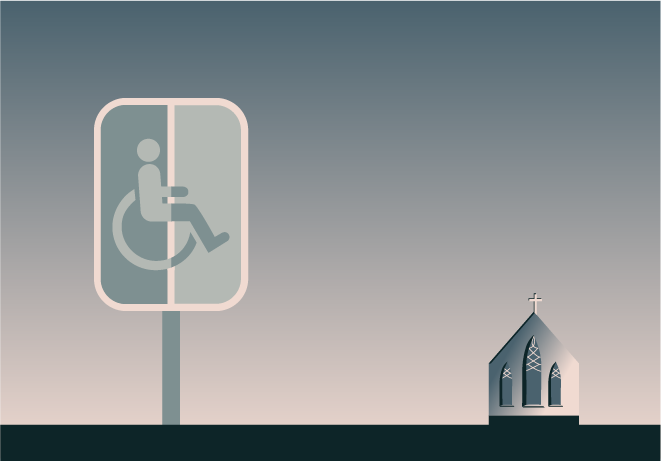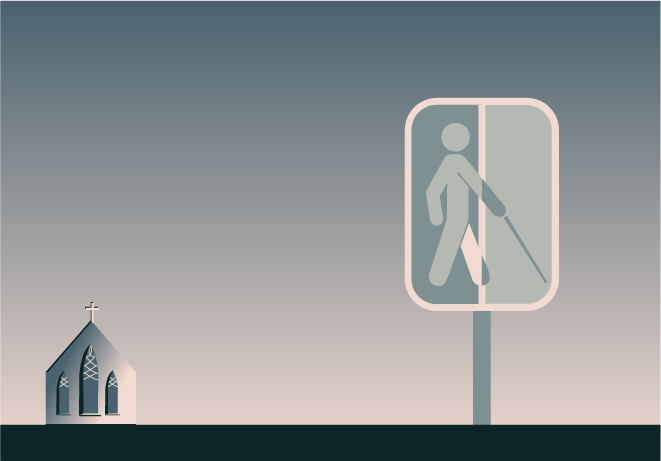The new data is in. Globally, the number of people living with disabilities has increased from 1 billion in 2011 to 1.3 billion today—from roughly one in seven people to one in six. Why the significant rise?
We can credit migrations, wars, crime, disease, and disasters, to name only a few causes. An increase in the number of births with disabilities has added to these numbers, and medical breakthroughs have also played a part. With advancements in antibiotics and heart surgeries, people with Down Syndrome and other intellectual and developmental disabilities are living much longer, with an average life span from 20 to 50+ years, even into their 60s. Consequently, their numbers have increased exponentially.[1]
Most people with disabilities suffer from isolation and lack of care.
We must also consider the effects of COVID-19, which increased not only the number of disabilities, but also the severity of those present prior to the virus. Surveys reveal that people with intellectual and developmental disabilities were as much as ten times likelier to succumb to the virus. The shocking rise in the number of Black Americans—especially Black men—disabled through gun violence further contributes.[2] These and many more factors explain why disability prevalence is on the rise.
Sadly, most people with disabilities suffer from isolation and lack of care. Many spend their entire lives in their homes with only parents and siblings to care for them. People with disabilities are still among the poorest, least educated, and least cared-for groups in the world. Their lack of access to local church services also makes them the least churched population globally.

Disability Vocational Workers on Mission
The good news is that a global workforce is already in place to reach this population: disability vocational workers. Health care, special education, social, and disability care workers—even family members—are a task force for disability care. What is more, they are in regular and ongoing contact with disabled individuals. Millions of highly competent vocational care workers deployed across the globe offer a near-perfect outreach plan. Committed Christian care workers are already positioned alongside people with disabilities.[3] That means they aren’t subject to the delays created by most support-raising and sending processes.
What can the presence of a Christian disability vocational worker mean to a person with a disability? It’s time to rethink how we can fully activate these vocational workers. It is time to mobilize God’s mission to those who may never be able to enter a church.
It is time to mobilize God’s mission to those who may never be able to enter a church.
There’s more great news: disability vocational care is rapidly increasing globally. As large residential institutions for people with disabilities are closing globally due to high expenses, abuse, and ineffective care, mobilized personal disability care is on the rise. Care is moving out of residential institutions and into homes and apartments in the community. This requires a mobilized vocational care force that can go into residences and creates another opportunity for Christian vocational care workers to come alongside people with disabilities as they offer disability care.

Jesus’ Mission Model
Is mobilized care a new approach? Not at all. Care ministry predates the church. Jesus went to people where they were and calls us to go too. He did not wait for people to come to him. The earliest church followed its master’s example. Personal one-on-one ministry dispatched from local churches traces its roots back to Acts. Not only was spiritual and personal care one of the church’s earliest ministry forms, but it was a top priority for the newly born church. Mobilized care was natural and spontaneous.
In Hebrews 13:3, the Apostle Paul admonishes Christians to ‘Continue to remember those in prison as if you were together with them in prison, and those who are mistreated as if you yourselves were suffering.’ In Paul’s time, prisons usually lacked care. Without care from the outside, a prisoner could starve to death in jail. It fell to families, friends, and churches to visit incarcerated people and care for them in prison.
Not surprisingly, chaplains and spiritual caregivers of all sorts have conducted one-on-one ministries for millennia. Individual disability care workers can go to all sectors of society through their employment. And churches can mobilize this kind of care.
Individual disability care workers can go to all sectors of society through their employment. And churches can mobilize this kind of care.

A Mission to One
Jesus promised that ‘where two or three are gathered’, he is there in their midst (Matt 18:20). The ministering of care to others requires only two. A person with a disability and a vocational care worker are a gathering. As such, they can even celebrate communion together. Christians have embraced this practice in extraordinary circumstances throughout history. People who cannot come to church have celebrated the Lord’s table with one other person since its inception. When just two people gather, they are in the presence of Christ.
Vocational care workers can bring spiritual care to people isolated with disability and can be the church to them. Let’s equip the church to be the church fully for people with disabilities by sending out its disability vocational care workers as ambassadors of spiritual care.

Understanding Spiritual Care
What is spiritual care?
1. Spiritual care is mission. Those who administer spiritual care strive toward one goal: to connect people to God. Whether through salvation for those who don’t know Jesus or through spiritual comfort and growth for those who do, a spiritual caregiver’s primary objective is to offer people relational realignment with their creator. Our mission is rooted in the image of God that connects us to him and reflects him and his glory to those around us.[4]
2. Spiritual care is a priority. It is not a spiritual supplement for our vocational care. Rather, through vocational care, God provides us with the personal contact and context in which we may administer his spiritual care in the lives of people. While both spiritual and vocational care are important, one is the means and the other is the goal. We reflect God’s image to people in our care so that we can connect them to God as we reach up to him. This is what we mean when we say, ‘Caring is a calling.’
Global Classroom
Disability Concerns Episode
Learn more about ministry among disabled persons in our 9-episode video series.
3. Spiritual care is transformative. It changes both the cared for and the caregiver. In listening, praying with, encouraging, comforting, and instructing others, we address bodily needs as part of our spiritual care. Paul attempts to capture the full impact of Jesus’ mission to earth in his letter to the church in Philippi. The message is simple—you should care for others the way Jesus cares for you:
God has always desired that all people in every place and time would encounter him and come to worship him. Spiritual care brings God’s redemptive power to these least-reached.
Therefore, if you have any encouragement from being united with Christ, if any comfort from his love, if any common sharing in the Spirit, if any tenderness and compassion, then make my joy complete by being like-minded, having the same love, being one in spirit and of one mind. Do nothing out of selfish ambition or vain conceit. Rather, in humility value others above yourselves, not looking to your own interests but each of you to the interests of the others. (Phil 2:1-4)
4. Spiritual care aims toward heaven. It looks up to our Lord, then it brings people to him. Caregivers call down God and his resources to address disability and spiritual needs. They look to their Father in heaven who withholds no good thing from his children. They are God’s presence in the lives of those they serve.
5. Spiritual care transcends boundaries of time, context, and demographics. People with disabling conditions are completely cross-sectoral. We must meet this diverse population where they are. God has always desired that all people in every place and time would encounter him and come to worship him. Spiritual care brings God’s redemptive power to these least-reached.
Waking the Sleeping Giant
What can all believers who do vocational care do to extend spiritual care? They can go to and be present with, listen to, pray for, encourage, and comfort people with disabling conditions who cannot go to church. This critical deacon-like ministry need not be done only by deacons. What is more, deacons usually will not have sustained, regular, and ongoing contact with people with impairments. Other people can go to church to receive spiritual care. God has equipped Christian disability care workers to bring care to others as Jesus instructed.
God has equipped Christian disability care workers to bring care to others as Jesus instructed.
Caring is a calling. Everyone is on a journey; some are on a mission. Vocational care workers can transform their job into a platform for mission to people with disabilities. A precious 1.3 billion people need to hear the gospel, receive ministry, and grow spiritually. By God’s design, disability vocational workers can be his hands and feet.
Let’s wake up the sleeping giant—disability vocational workers in fields such as health care, inclusive education, social services, and more. These may well be the only church that many people with disabilities will ever know. Churches would do well to support these effective missionaries in any way they can. This is God’s mission strategy to reach the unchurched.
Endnotes
- “Disability,” World Health Organization, March 7, 2023, https://www.who.int/news-room/fact-sheets/detail/disability-and-health. ↑
- Neelam Bohra, “Paralyzed by Gun Violence, They Seek Solace from Other Survivors,” New York Times, January 3, 2023. ↑
- Recently, the Lausanne Disability Concerns Issue Network intentionally selected health care, inclusive education, and disability services as ministry catalysts to lead its issue network. See Dave Deuel, “Taking Church to People with Impairments: A new initiative for the Lausanne Disability Concerns Issue Network,” Lausanne Global Analysis (forthcoming). ↑
- John F. Kilner, Dignity and Destiny: Humanity in the Image of God (Grand Rapids, MI: Eerdmans, 2015). ↑


